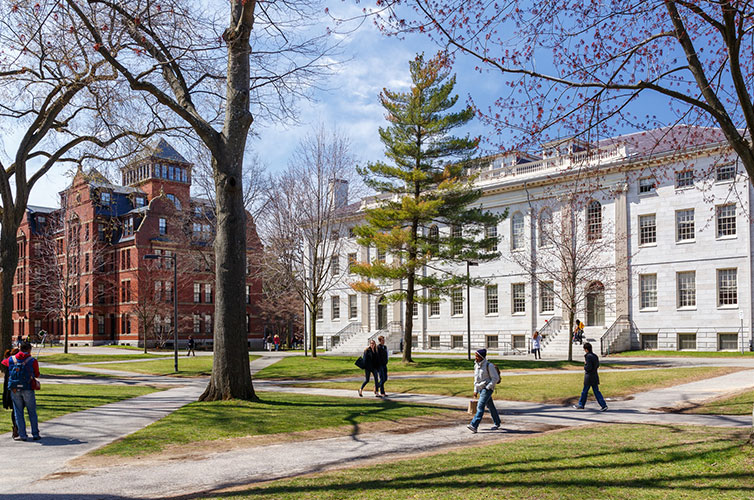The U.S. has the largest number of international students enrolled in its universities (more than 1,000,000). Over 5% of the students studying in the U.S. are foreign students studying abroad in the U.S. This number is growing every year!
Attending college in the U.S. is a goal for many international high school students. Last week we were Dispelling 8 Myths About Studying Abroad, and now we’re dispelling the top myths about studying abroad in the U.S. With these tips in mind, we’ll help achieve your study abroad goal, so let us show you how!
1. Studying abroad in the U.S. requires me to be rich
Yes, American universities are expensive, but public universities are a lot more affordable. International students also have access to merit-based scholarships. Don’t let the “sticker price” of the tuition and room and board dissuade you from studying abroad in the U.S.!

2. I’m fluent in English, therefore I don’t need to take the TOEFL or IELTS
There’s no standard application process for U.S. universities. For this reason, students must check each university’s criteria for the TOEFL/IELTS exam. Many schools require international students from a country where English is not the national language to take a language exam. Each university also sets their own passing score.
3. The TOEFL and IELTS are essentially the same
The TOEFL and IELTS exams have many differences. The TOEFL offers only academic English while the IELTS offers an academic option and a general test. Whether it’s the TOEFL or the IELTS, practice before you take the exam!
Both the TOEFL and IELTS have wide acceptance in U.S. universities, however, some colleges have their preferences. When deciding which test to take, check with the universities you’re applying to and see if both tests are accepted.

4. Applying to college in the U.S. is centralized
Things would be much simpler if this were true. The college application process varies from college to college. Each college sets their own rules, criteria, and deadlines. There is no one true “universal” application.

5. Since English isn’t my first language, colleges won’t expect my essay to have perfect grammar
Colleges are more competitive than ever. If studying abroad in the U.S. at a top-tier university is your goal, students must have a strong grasp of the English language and grammar.
6. The U.S. doesn’t have many international students enrolled in its universities
For the 2015-2016 academic year, the number of international students studying abroad in the U.S. exceeded 1 million, according to a recent report from the Institute of International Education. The American culture is unique, but international students CAN avoid culture shock in the U.S.!
7. The steps in applying to U.S. colleges are completely different for international students
Applying to U.S. colleges are largely the same for international and domestic students. International students need to take a few additional steps to make up for the differences in the school curriculum, grading system, and language.
- Most colleges in the U.S. require international students to obtain a minimum score on language tests, like the TOEFL.
- As an international student, you need to supply the university with a certification of finances. The university wants to ensure you can afford the tuition and living expenses before you get a visa and move to the U.S.
- International students applying to U.S. colleges may also be required to have their transcripts and/or other educational credentials assessed by an official organization. This is because the grading system used by certain schools is different from the typical 4.0 scale utilized in the U.S.
- You must determine the legal requirements associated with studying abroad in the U.S. and apply for a student visa.
8. It’s difficult to get a student visa
Once a student is accepted to a university, the steps are straightforward. First is to ensure the university they’re applying to is accredited by the U.S. government’s Student and Exchange Visitor Program (SEVP). Only SEVP-approved institutions can enroll students in the Student and Exchange Visitor Information System (SEVIS). After an international student has been accepted, the university will enroll them in the SEVIS system. SEVIS will provide the students with the necessary documents to apply for a U.S. student visa.
9. As soon as I graduate, I must leave the U.S.
After studying abroad in the U.S., many international students want to stay in the U.S. These students can apply for twelve months of optional practical training (OPT). This allows them to work in fields related to their areas of study while building their skill-set. The difficulty is that not just any job will do, the job must be specific to their field of study.
You can also pursue an advanced degree which extends the student visa. After the advanced degree is obtained, you can apply for an additional twelve months of OPT. The process of finding long-term employment and receiving company sponsorship is not always easy, but it is certainly doable. If your major is specific and in-demand, the easier the process becomes.
Studying abroad in the U.S. is a lifelong dream for many. That dream can be achieved with proper planning and diligence. Once you have your college plans made, be sure to check out the travel deals we have for international students!



0 Comments